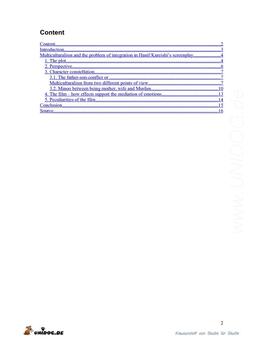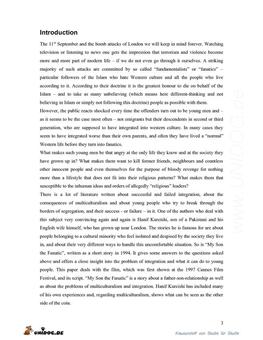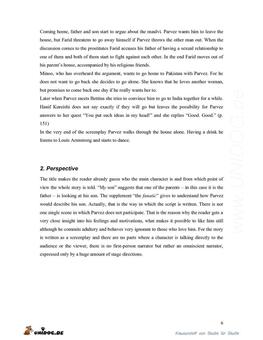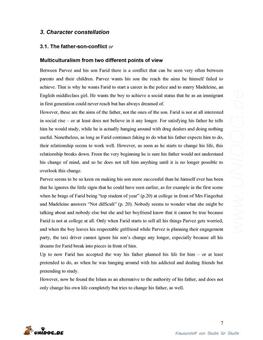| Dokumente | |
|
|
Dokumentvorschau |
My Son the Fanatic - A screenplay by Hanif Kureishi |
Dokument-Nr.: F-AA1P |


|
|
Dokument-DownloadUm Zugriff auf dieses Dokument zu erhalten, musst Du Mitglied der UNIDOG Community sein. |
|
Inhalt / Beschreibung
Content Introduction Multiculturalism and the problem of integration in Hanif Kureishi’s screenplay 1. The plot 2. Perspective 3. Character constellation 3.1. The father-son-conflict or Multiculturalism from two different points of view 3.2. Minoo between being mother, wife and Muslim 4. The film – how effects support the mediation of emotions 5. Peculiarities of the film Conclusion Source ___________________________________________ Introduction The 11th September and the bomb attacks of London we will keep in mind forever. Watching television or listening to news one gets the impression that terrorism and violence become more and more part of modern life – if we do not even go through it ourselves. A striking majority of such attacks are committed by so called “fundamentalists” or “fanatics” – particular followers of the Islam who hate Western culture and all the people who live according to it. According to their doctrine it is the greatest honour to die on behalf of the Islam – and to take as many unbelieving (which means here different-thinking and not believing in Islam or simply not following this doctrine) people as possible with them. However, the public reacts shocked every time the offenders turn out to be young men and – as it seems to be the case most often – not emigrants but their descendents in second or third generation, who are supposed to have integrated into western culture. In many cases they seem to have integrated worse than their own parents, and often they have lived a “normal” Western life before they turn into fanatics. What makes such young men be that angry at the only life they know and at the society they have grown up in? What makes them want to kill former friends, neighbours and countless other innocent people and even themselves for the purpose of bloody revenge for nothing more than a lifestyle that does not fit into their religious patterns? What makes them that susceptible to the inhuman ideas and orders of allegedly “religious” leaders? There is a lot of literature written about successful and failed integration, about the consequences of multiculturalism and about young people who try to break through the borders of segregation, and their success - or failure – in it. One of the authors who deal with this subject very convincing again and again is Hanif Kureishi, son of a Pakistani and his English wife himself, who has grown up near London. The stories he is famous for are about people belonging to a cultural minority who feel isolated and despised by the society they live in, and about their very different ways to handle this uncomfortable situation. So is “My Son the Fanatic”, written as a short story in 1994. It gives some answers to the questions asked above and offers a close insight into the problem of integration and what it can do to young people. This paper deals with the film, which was first shown at the 1997 Cannes Film Festival, and its script. “My Son the Fanatic” is a story about a father-son-relationship as well as about the problems of multiculturalism and integration. Hanif Kureishi has included many of his own experiences and, regarding multiculturalism, shows what can be seen as the other side of the coin. |
|
Vorschau-Ausschnitte
|
|||||








